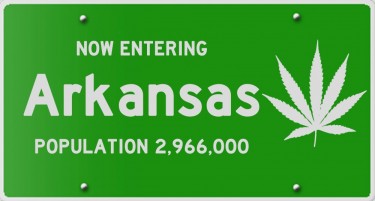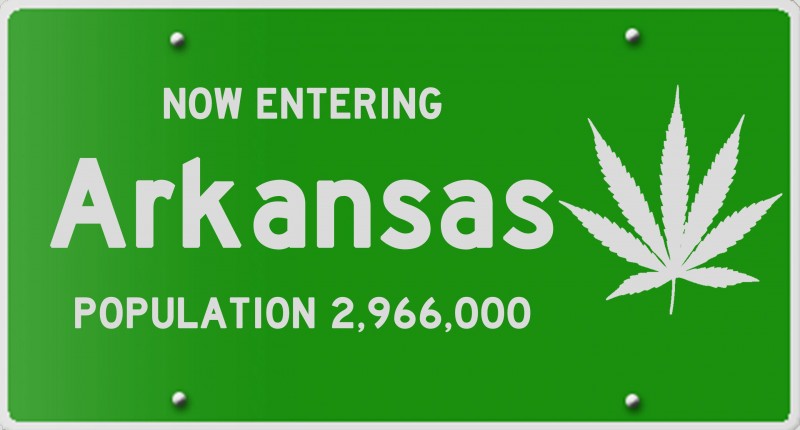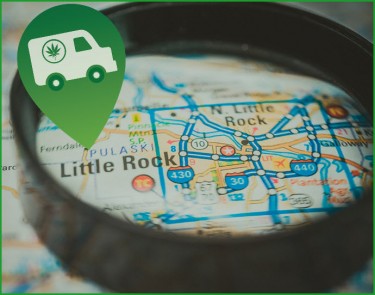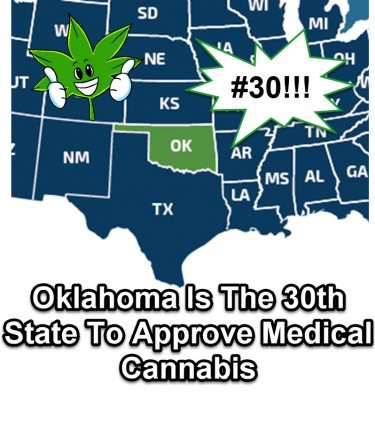The Arkansas Cannabis Monopoly

In November 2016, Arkansas voters passed Issue 6 with a 53% vote allowing for medicinal cannabis (marijuana). Little did future patients realize how badly the Arkansas program was set up. After legislation was approved to provide administrative and legal structure to the program, problems quickly ensued. Many patients went through the expense and effort of certification and received medical cannabis cards in 2018. The license was essentially worthless since patients couldn’t purchase medicine from an industry still struggling to launch. The licensing and implementation process took so long that the state had to reissue and extend cards to patients who got theirs too early. Despite legalization by voters in 2016, patients were not able to purchase medicinal cannabis products until over two years later in mid-2019 when the first two dispensaries finally opened. Arkansas patients had to watch in envy while our neighbor, Oklahoma, quickly voted in, implemented, and surpassed our state with a thriving cannabis industry (minus the roadblocks seen in our fledgling industry). The struggle to launch did not end there. Other problems with the cannabis program quickly ensued. There are so many unfair rules and weaknesses within Issue 6 that it is hard to figure out where to begin the discussion. We have broken down many of its detractions.
Restrictions on Products
Arkansas legislators were able to impose several restrictions to the patient care process by deciding which medical conditions are appropriate for doctors to legally prescribe cannabis. Restrictions on patients’ personal choice of how to use their cannabis medication were made as well. These rules include legal restrictions on selling products for smoking cannabis such as rolling papers and pipes. Other personal choice constraints include certain edible product bans (under the pretense of not appealing to children) and age restrictions for smokable product types. The state has also stepped in and limited the max dose of THC per serving to 10 milligrams. This shows the general lack of knowledge about cannabis in this state. For most patients, 10 milligrams of THC is very low, forcing the patient to either eat more of the already expensive servings or make their own edibles. The average retail price for a small package of 10 cannabis gummies costs Arkansans approximately $40 ($4 per 10mg gummy serving).
Lack of Organizational Support for Cannabis Related Businesses
Granted, small business support in the cannabis industry seems to be an issue in all states- to differing degrees. Arkansas is certainly no exception to this fact. Small business mentoring support under the SCORE program (a program that helps business owners with volunteer mentors and other assistance programs) has closed its doors to the fledgling cannabis industry due to continued federal illegality. This business industry discrimination is happening despite legalization and recognition of cannabis legality by most states in our country.. The support and guidance needs of new business owners does not stop just because the company is cannabis related. Another glaring issue is finding banking services for cannabis related businesses. The Arkansas banking industry does not have the minimal banking network support that many other states enjoy. Federal illegality continues to hold Arkansas’ cannabis industry hostage to outrageous fees and deposits. These fees are required by the few banks that are willing to provide basic banking services for Arkansas cannabis related businesses because they must abide by federal FDIC rules. These high fees and deposits are charged by these banks to offset the very strict and time-consuming banking compliance requirements and for “risking” federal sanctions for handling a federally illegal account. Fee schedules range from $249 to $1500 per month just to service the account, not including other banking fees. Some providers ask for a substantial upfront deposit to access their banking services (one particular quote was asking for a $10,000 up-front deposit). These requirements essentially exclude any social equity in our program by restricting who can afford to access these banking services. Other banking issues include:
Outrageous Medication Costs
Arkansas’ prices for cannabis medication continue to put this potential life-saving plant out of reach for many residents. Those who are able to afford the high fees to be “certified” by a physician that they have an approved medical condition under the state laws of Arkansas are soon faced by a state license fee, caregiver fee (for those needing assistance of another person to obtain medication), and travel costs related to getting to the nearest dispensary. Certification fees range from $50 to $250 depending on the physician. Some do offer payment plans for this out of pocket expense. An Arkansas Medical Marijuana license then costs $50 for the state to process and issue it. Once the license is received, patients then experience further sticker shock. Patients soon find that there is no health insurance coverage to offset high medication prices. The average cost of an eighth of premium cannabis flower in 2019 was priced at an average of $50. Today, a year and a half later (with more cultivators now producing and some dispensaries growing additional flower), the price has not decreased. As a matter of fact, new offerings by cultivators have only increased in price with new flower strains being offered for $55 to $60 per eighth. With over half of cannabis patients needing a gram or more of flower per day, the expense quickly adds up. For patients who use cannabis in arguably the most medicinal way possible (eating), it is next to impossible to afford unless you have a large medication budget. For example, when compared to other medical states such as Oklahoma and Washington, a popular edible product called RSO costs ten to twenty times more in Arkansas. Specifically, RSO products in these states can be found on Weedmaps priced at $5-$10 per gram whereas Arkansas’ average price is $100 per gram. At times, RSO specials (sales on cannabis products are not allowable for dispensaries either) can be found for cancer patients such as this one in Oklahoma for 1 penny. For Arkansas patients who are following the Rick Simpson method of RSO treatment of 1 gram daily for 60 days, how can anyone afford this? Many Arkansas patients remain inadequately medicated due to these overwhelming costs while living in a predominately poor, rural state.
Ongoing Cannabis Flower Shortage
The Arkansas cannabis industry was frameworked to support an average of one cultivator to every 6,000 patients. Lawmakers originally projected an average cannabis patient service need of around 30,000 total patients and thus set the legal guidelines of initially licensing five total cultivators (growers) with a potential to allow an additional 3 more license awards if necessary. These have recently been released and are in process of construction. The current caseload of Arkansas cannabis applicants is over 93,000 patients. If you do the math, our industry is already trying to support a level of patient participation that exceeds the capacity provided under the law. Whether due to ignorance of its explosive medicinal potential, continued legislative stigma associated with its use, or other more nefarious reasons such as price and industry manipulation, the problem is clear and remains unresolved. There is no real resolution for this situation as it currently stands under the law. The caseload will only continue to increase without the possibility of adding more cultivators to support the extra product demands. Despite these facts, the original group of five Arkansas cultivators filed a lawsuit to prohibit the state from expanding cultivation to the maximum amount allowed by law. Further stumbling blocks (such as this one in the form of another lawsuit) continue to slow down cultivation expansion.
More recently, another relevant situation has come to light that adds insult to injury for Arkansas cannabis patients. A loophole in the Arkansas law allows for out-of-state cannabis patients to obtain a temporary license in our state. Due to a technicality, these patients are able to circumvent the legal cannabis limit imposed on Arkansas residents. They are able to purchase up to the maximum allotment in one visit at a dispensary (set at 2.5 ounces every 14 days under state law). These patients are then able to immediately and without limit make return visits to purchase additional maximum amounts until license expiration. This inadequately policed and unanticipated out-of-state caseload only worsens a shortage of affordable product for Arkansas patients.
Inadequate Dispensary Coverage for a Rural State
As it stands there are only 33 dispensaries allowed by law in the state, all of which are not launched and open. This leaves many patients with very long drive times to obtain their medications. As a comparison, our neighboring state Oklahoma has over 1900 licensed dispensaries. Many patients in Arkansas are left with four or even six hour round-trip drives to pick up their medications. Although some dispensaries do deliver, patients usually must pay at a $15 delivery fee along with the average price of a $1 per mile. Usually, the dispensaries also have a limit on how far they will drive. So if the patient is out of the radius of delivery, they are stuck finding a way to get there despite not being mobile. There have been recent business startups that offer patients a ride to the dispensaries. Just like any business associated with cannabis, trying to find financial services to manage income is nearly impossible even in the secondary cannabis market.
Allegations of Conflict of Interest
Arkansas has what is called a MMC or Medical Marijuana Commission. The head of the commission is Travis Story (although a new head will be elected in November of 2020 who is also a practicing lawyer in the state of Arkansas). According to court documents, Travis Story has been accused of having personal ties with cultivators to whom he has granted a grow license. Here is a short clipping from a local news article. “Our report is that Commissioner Travis Story, a Fayetteville lawyer, had done legal work in the past for Jay Trulove and his family. Berryville owners of the Osage Creek Cultivation medical marijuana cultivation business finished in the top five in the competition (and got a very high score from Story).” A petition has even been created on Change.org calling for the resignation of Travis Story with nearly 500 signatures collected. This situation has left many patients questioning the actions of the MMC behind closed curtains and wondering if they are even being heard.
Medical Cannabis For Kids? Nope, get them taken by DHS..
Although there are a few progressive Arkansas doctors that are willing to help kids with severe health issues, the state’s Department of Human Services (DHS) has stepped in and told them, “No.” The division made it clear to parents who were issued a license for their children that if the children test positive for THC, they would be removed from the home. This is an absolute shame and shows the continued stigma and lack of cannabis education in government agencies. Children with seizures and cancer are denied this medicine despite the law allowing minors to receive a medical cannabis card with parental consent. This should be a clear violation of basic childrens and parent’s rights. Due to a lack of lawyers willing to handle cannabis claims, these kids are forced to continue on dangerous pharmaceuticals while DHS continues to terrorize Arkansas families. It has been verified through legal channels that the majority of lawyers and firms will not touch cannabis cases in the state of Arkansas.
What about MMJ patients buying a gun in Arkansas?
Nope, not if you are a medical cannabis patient. In the great state of Arkansas, despite protection from the second amendment, the state has decided that potheads are dangerous and can’t purchase a gun legally (regardless of criminal history). Protection at work? No way! Arkansas is an employment-at-will state. The state does not protect its mmj patients from drug tests at work and leaves it up to the employers' regard. Sadly enough there are literally still groups in Arkansas who continue to perpetuate propaganda that cannabis is still the “devil’s lettuce”. Again, more that doesn’t make sense in this “natural state”.
Outlook for the Arkansas Cannabis Industry
As it currently stands, there is no hope of any further amendments to change the Arkansas cannabis scene- without having a major state vote. Currently, federal legalization remains the best hope for Arkansas patients. Funny enough, when you mention the term “recreational'' in the dispensaries in Arkansas, they immediately start insinuating that the “taxes” in recreational will cause cannabis prices to increase. It’s hard to imagine that recreational cannabis which would result in an influx of dispensaries and cultivators would “increase” prices, but again this is a state with no oversight and many dirty locals who rather line their pockets instead of representing the people’s needs.
To sum up the cannabis industry in Arkansas, in the words of one patient, “ The best way to compare is to socialism. The SAME PEOPLE control the growth, sell, price…… and LAWS. It is way too political, price gouging, and shady…. The best part about the Arkansas MMJ card is being able to obtain a card for Oklahoma where it’s a (for the most part) free capitalist market.”
… To Read More Feedback From Arkansas Patients, Click Here
Article Written By:
Melissa Cornwell
Founder of DarkHorse Delta Enterprises, LLC, creator of The Cannabis Calculators, and writer for Ark420 and CannaCook.com
&
Christopher Miles
Founder of CannaCook.com & Ark420
(Sources: https://www.healthy.arkansas.gov/programs-services/topics/medical-marijuana)
STATE PROBLEMS AND WEED, READ MORE...
ARKANSAS' MEDICAL MARIJUANA PROGRAM HITS $33 MILLION IN WEEKS!








